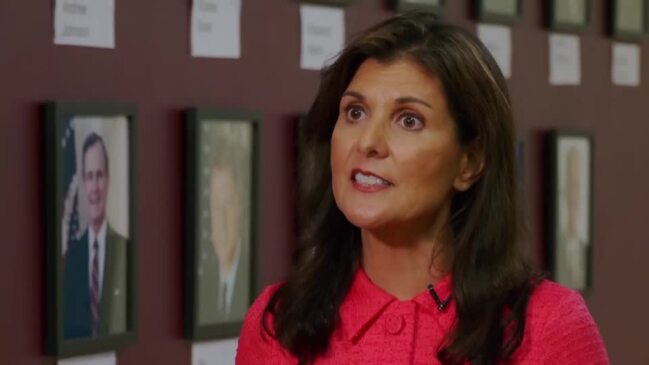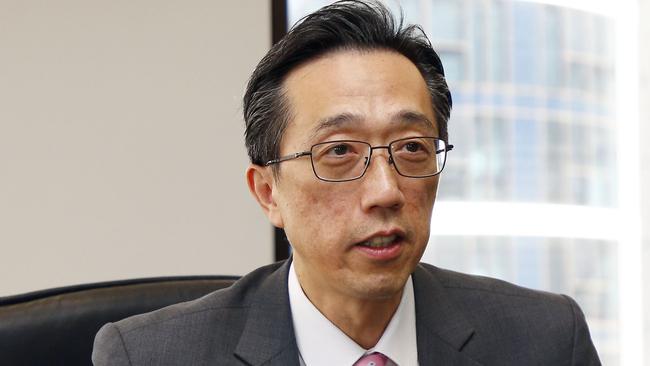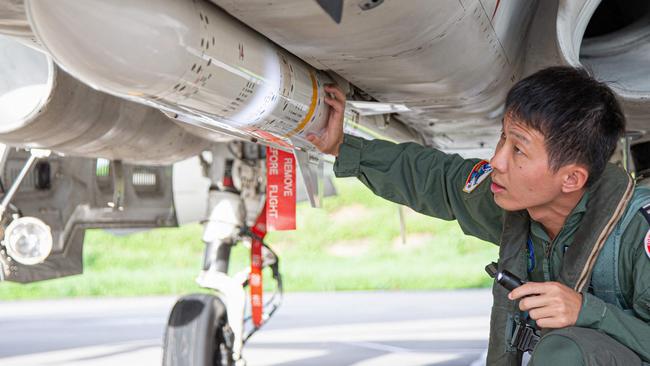Australian gas to buttress Taiwan security as China threat deepens
Taiwan plans to increase its imports of Australian LNG to fortify its energy reserves against an increasingly belligerent China while exiting from nuclear-generated power.

Taiwan will buy more liquefied natural gas from Australia in a bid to buttress its energy security against a potential attack from China as geopolitical tensions simmer between the neighbouring countries.
Taiwan’s new chief representative to Australia, Douglas Yu-tien Hsu, said that as the island moves away from nuclear energy, imports of LNG from Australia were playing an important role in the transition of the tech-heavy economy.
Australia is now the biggest supplier of LNG to Taiwan as well as investing in major wind farms in the Taiwan Straits.
Mr Hsu said that unlike wind farms and nuclear power plants, LNG reserves were less vulnerable to a potential attack by China. Australia accounts for 37 per cent of Taiwan’s LNG supply, totalling $11.6bn last year. .
“We currently have three nuclear plants that are going to be gradually phased out,” Mr Hsu said in Brisbane.
“Honestly, the cross-strait relations right now has made my government think about contingencies and one way is to address energy resilience.
“Of course (we have to ensure) the nuclear plants and the wind farms can’t be an easy target so the issue is how are we going to address those energy contingencies.
“That is one reason that Australia is now Taiwan’s largest LNG provider because if we carefully store it in undisclosed locations it will be easier. Of course in peacetime, LNG is also a good way for us to transition from nuclear to renewables.”
Australian LNG shipments to Taiwan have almost trebled to 8.1 million metric tonnes since 2018 and are expected to grow further as the island transitions to a decarbonised economy and phases out nuclear power by 2025.

Taiwan Deputy Foreign Minister Chung-Kwang Tien last year said Australia had the potential to be an energy hub for the region and play a part in his nation’s shift to renewable energy. Mr Hsu said Taiwan was eager to follow Japan’s lead by investigating the importation of Australian hydrogen.
“We have already decided that we’re going to fade away from nuclear and find new sources of energy,” he said. “In the past few years my government has already done a lot to set up offshore wind farms and the electricity provided by those farms is now very stable.
“Of course we are still not there yet and we are looking for other sources of green energy or renewable energy. Hydrogen is definitely one for the future.”
Taiwan, like Japan, is pursuing aggressive renewable targets It last year announced it aimed to have zero carbon emissions by 2050. The government-backed Taiwan Industrial Technology Research Institute is working on “virtual power plants” that would manage grid demand as it increased the mix of renewables in the energy mix.
Mr Hsu, who was previously the top US specialist in Taiwan’s foreign ministry, said the Russian invasion of Ukraine highlighted the need for democracies to work together – not just at the diplomatic and military levels but in trade and economic co-operation.

Mr Hsu said so-called “unification” with mainland China was “definitely not a choice” for the Taiwanese people because of the increasingly aggressive stance against the island taken by the Chinese leadership.
“We have been facing this direct threat for ages,” Mr Hsu said. “Especially in the last two years since Russia’s invasion of Ukraine, we understand we have to beef up our asymmetric warfare capability. We also have to work with like-minded partners to send out the message loud and clear to Beijing to make sure they do not act irrationally.”
Taiwan is pressing for Australia’s support in its application to join the Transpacific Partnership (CPTPP), a massive trade agreement signed by 12 Pacific Rim countries, including the US. But China, which also is seeking membership, is likely to push back hard against any support for Taiwan to join the trade bloc. The UK is also seeking membership.
“Taiwan submitted its application two years ago so it is definitely our goal,” Mr Hsu said. “It will put Taiwan in a better position doing business and dealing with other trading partners. “Australian support is essential because the CPTPP is a mechanism that is based on the consensus of members.”
He said CPTPP members were likely to consider the issue of Taiwan joining the bloc after the UK’s application was considered.
“It seems to me that people are like reluctant to show which direction all members are likely to go until after the UK accession is resolved,” he said.
“There are rumours, or at least some people believe, that you will need to bundle Taiwan and China’s application together because you don’t want to cause any further trouble from Beijing.
“But I think the CPTPP is a trade mechanism and it needs to be considered on the trade and related merits rather than political issues.”



